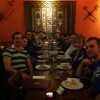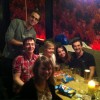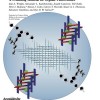Research in the TuttleLab is focused on the concept of reducing molecular search spaces. The reduction of molecular search spaces involves the use of computational methodology to inform, focus and drive the direction of molecular research. The group works in close collaboration with experimental colleagues to ensure the results from our design work are able to be directly implemented in a practical laboratory. The process of reducing molecular search spaces involves three phases: (1) rationalising and understanding existing systems; (2) isolating the governing molecular processes; and (3) predicting new systems with enhanced/desirable properties and reactivities. A variety of different methods are used in pursuit of this goal, including ab initio, DFT, semi-empirical, MM, coarse grain and hybrid QM/MM methodologies.
News From the Lab

TuttleLab Christmas Dinner – 2012
Christmas came early to the TuttleLab this year, and the group headed out ahead of the crowd to Khubla Khan’s for a Mongolian experience. This restaurant gave the group a unique experience, in which we got to choose from a variety of exotic meats and season them ourselves before the chef cooks in on a […]

Welcome to new TuttleLab Members – 2012
Welcome to our new PhD students Greg Anderson and Ivan Ramos-Sasselli. Greg and Ivan join the group under the joint supervision of John Murphy and Rein Ulijn, respectively. We also welcome our new final year students Allan Young, Amy Romaniuk, Jessica Padden and Sarah Christmas, who will all work with the group for the next 5-6 months […]
Final Year Graduants – 2012
Congratulations to our final year students Ivan Ramos-Sasselli (ERASMUS), Emily Bell (MSci) and Deborah Cleary (BSc Hons), who all graduated today! Best wishes for the future from all of us in the group! We are particularly proud of Emily Bell who won the Final Year Forensic Society Award for her marks and thesis. A well-deserved result!

Work on Organic Photovoltaics chosen as Inside Cover for Angewandte
Our latest work in collaboration with the Skabara group has been chosen as a frontispiece for the communications section in Angewandte Chemie International Edition. Read more about this work by following this link. X marks the spot! A fascinating packing motif is observed in a novel cruciform oligothiophene containing a Ge (violet; see picture) spiro center. […]








